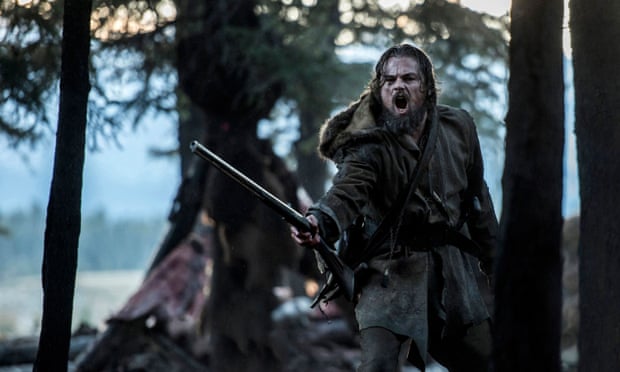Is the theme of revenge or survival more important in “The Revenant”?
Quick Answer: Wounded and left for dead in the 1820s American wilderness, frontiersman Hugh Glass is gripped by two major desires: revenge and survival. But does one desire outweigh the other? Are they concomitant, or is one a byproduct of the other? While the film’s pre-release promotional materials suggested that revenge would be the film’s major theme, it doesn’t come to the fore until the film’s final act. Instead, the film emphasizes survival and the strength needed to achieve it. That said, the dual themes strengthen and invigorate one another. Through both, we see humanity sink to its darkest depths, resulting in unbridled violence and resilience.
Academy Award-winning The Revenant (2015) is an American historical epic, “loosely inspired” by true events. These two words largely inform the film’s plot; they indicate that the “real” experiences of the frontiersman Hugh Glass have been adjusted and perhaps exaggerated. Through this twisting and reinterpreting of real events, Iñárritu creates a spaces in which he can more deliberately explore and flesh out the film’s themes. Although marketing strategies, trailers, posters and other media sources indicated that the film would primarily be a revenge tale, it becomes immediately clear that The Revenant’s overarching theme is the struggle to survive under critical circumstances.

Leonardo DiCaprio in The Revenant (2015)
While a small pack of fur trappers traverses the American wilderness in 1823, one of its members, Hugh Glass (Leonardo DiCaprio), is mauled by a grizzly bear. Despite Glass’ successfully killing the beast, he is mortally wounded and placed on a stretcher, slowing down the team’s journey. Becauses the wounded Glass slows the party’s march, John Fitzgerald (Tom Hardy) decides to leave Glass for dead before murdering his son, Hawk (Forrest Goodluck), when the youth interrupts the murder. Witnessing this, Glass climbs out of his grave and travels across the wilderness. At this point in the film, Glass is gripped by two major desires: revenge and survival. But does one desire outweigh the other? Are they concomitant, or is one a byproduct of the other? Although revenge may be The Revenant’s teleologial endgame, its realization is contingent upon Glass’ survial.
Because we spend much of the film watching Glass’ mounting dilapidation as he fights the elements, The Revenant can primarily be seen as a survival film. The film’s frequent violence and graphic details emphasize this thirst to survive. Glass’ deteriorated condition is emphasized in particular, as evidenced by continual close-ups of his torn throat, slashes on his back and blood in his hair. After crawling out of his grave, Glass begins to slowly heal himself by trying to fix his wounds. Iñárritu’s attention to detail is central in depicting the protagonist’s desire to survive.

The Revenant (2015)
In addition to this attention to detail, the other element that creates such a rich survival film is DiCaprio’s gruelling, Oscar-winning performance. It is common knowledge now that Leonardo DiCaprio above and beyond for his performance as Hugh Glass. Some of the risks he took were, in fact, considered shocking. For example, he ate raw bison liver and actually slept in a sliced-open horse carcass. These duties for the role were crucial for DiCaprio to truly immerse himself in the character. They also showcase the often repulsive side of survival. DiCaprio’s performance is unique in that it is wholly visceral. While he often plays chatty, smooth-talkers, The Revenant is a little different. DiCaprio’s role is mostly a silent one, and there is little dialogue throughout the film. Because of this, Glass’ desperation is brought to the fore. In his tale of survival, words are an often-futile accessory.

Leonardo DiCaprio in The Revenant (2015)
It is only when Glass returns to the fort that we see him seek revenge against Fitzgerald. We also see Fitzgerald’s transformation into a fully formed villain; not only has he left his loyal companion for dead and killed his son, but he has developed a lustful ambition for money from Andrew Henry (Domhnall Gleeson). Glass recovers at the fort and tells his companions of Fitzgerald’s treachery. Then, seemingly fully healed, Glass ventures out to find and kill him. After Fitzgerald kills and scalps Henry, Glass sends him down the river to the Native Americans who will take their own revenge against Fitzgerald. In this respect, The Revenant is an animalistic representation of humanity. Not only do we see man at his grittiest and most perseverant, but also his most savage.
Though The Revenant’s pre-release promotional materials suggested that revenge would be the film’s major theme, it doesn’t come to the fore unti lthe film’s final act. Instead, the film emphasizes survival and the strength needed to achieve it. It is by no means a flaw that the overarching theme (survival) may overshadow the, apparently, central one (revenge). Indeed, these two themes strengthen and invigorate one another. Through both, we see humanity sink to its darkest depths, resulting in unbridled violence and resilience.

